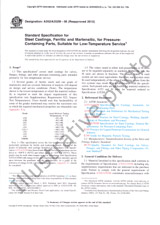We need your consent to use the individual data so that you can see information about your interests, among other things. Click "OK" to give your consent.
ASTM D3609-22
Standard Practice for Calibration Techniques Using Permeation Tubes
Translate name
STANDARD published on 1.11.2022
The information about the standard:
Designation standards: ASTM D3609-22
Publication date standards: 1.11.2022
SKU: NS-1096717
The number of pages: 5
Approximate weight : 15 g (0.03 lbs)
Country: American technical standard
Category: Technical standards ASTM
The category - similar standards:
Annotation of standard text ASTM D3609-22 :
Keywords:
analyzers, butane permeation tubes, calibration, CL2 permeation tubes, gas permeable tubes, H2S permeation tubes, NH3 permeation tubes, NO2 permeation tubes, propane permeation tubes, SO2 permeation tubes ,, ICS Number Code 17.020 (Metrology and measurement in general)
Additional information
| Significance and Use | ||||
|
5.1?Most analytical methods used in air pollutant measurements are comparative in nature and require calibration or standardization, or both, often with known blends of the gas of interest. Since many of the important air pollutants are reactive and unstable, it is difficult to store them as standard mixtures of known concentration for extended calibration purposes. An alternative is to prepare dynamically standard blends as required. This procedure is simplified if a constant source of the gas of interest can be provided. Permeation tubes provide this constant source, if properly calibrated and if maintained at constant temperature. Permeation tubes have been specified as reference calibration sources, for certain analytical procedures, by the Environmental Protection Agency 1.1?This practice describes a means for using permeation tubes for dynamically calibrating instruments, analyzers, and analytical procedures used in measuring concentrations of gases or vapors in atmospheres 1.2?Typical materials that may be sealed in permeation tubes include: sulfur dioxide, nitrogen dioxide, hydrogen sulfide, chlorine, ammonia, propane, and butane 1.3?The values stated in SI units are to be regarded as standard. 1.4?This standard does not purport to address all of the safety concerns, if any, associated with its use. It is the responsibility of the user of this standard to establish appropriate safety, health, and environmental practices and determine the applicability of regulatory limitations prior to use. 1.5?This international standard was developed in accordance with internationally recognized principles on standardization established in the Decision on Principles for the Development of International Standards, Guides and Recommendations issued by the World Trade Organization Technical Barriers to Trade (TBT) Committee. |
||||
| 2. Referenced Documents | ||||
|
We recommend:
Technical standards updating
Do you want to make sure you use only the valid technical standards?
We can offer you a solution which will provide you a monthly overview concerning the updating of standards which you use.
Would you like to know more? Look at this page.




 Cookies
Cookies
